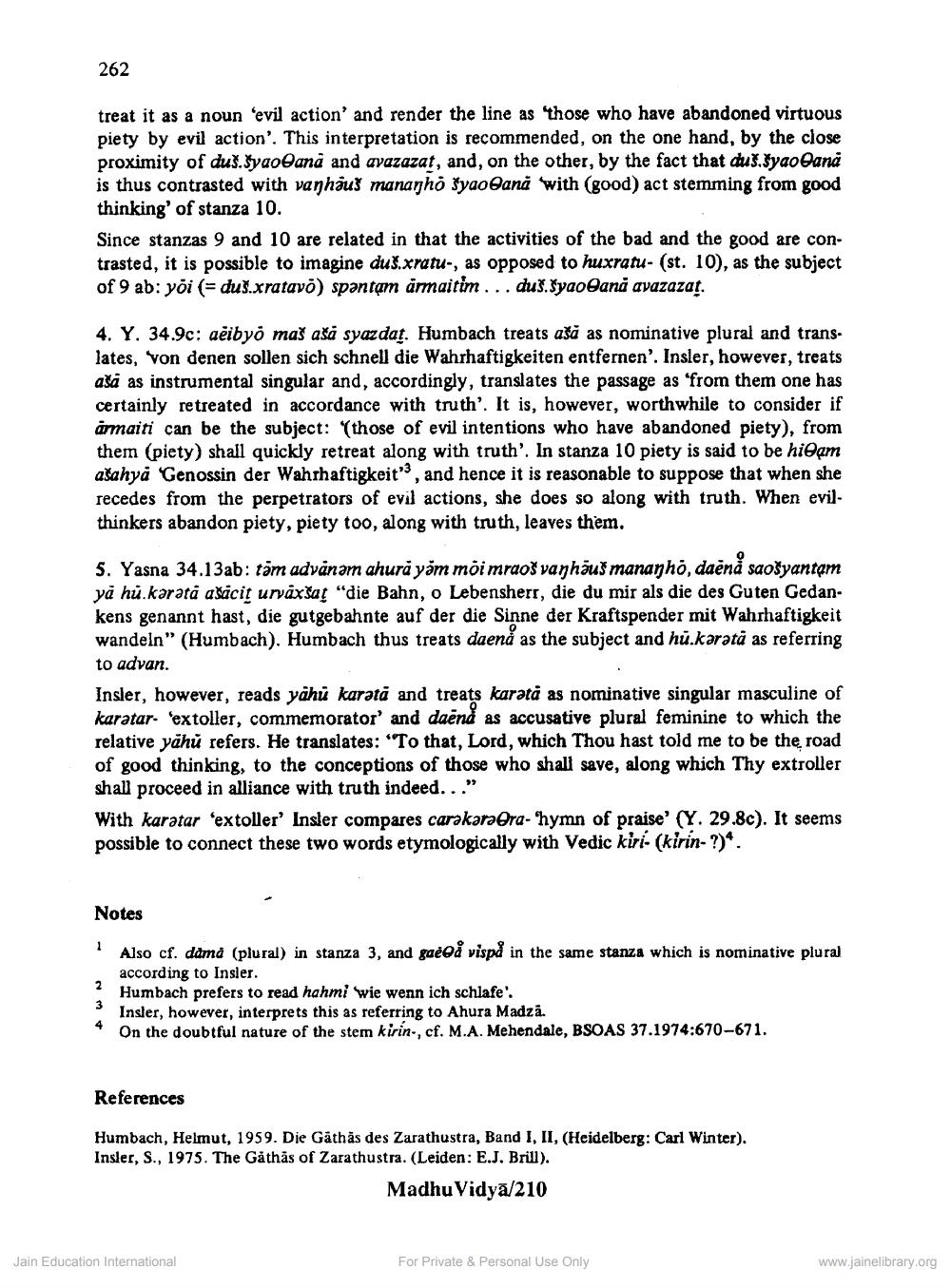________________
262
treat it as a noun 'evil action' and render the line as those who have abandoned virtuous piety by evil action'. This interpretation is recommended, on the one hand, by the close proximity of duš. Syao Dana and avazazat, and, on the other, by the fact that dur.Syao Dana is thus contrasted with vanhäus mananho fyao Banå with (good) act stemming from good thinking' of stanza 10. Since stanzas 9 and 10 are related in that the activities of the bad and the good are contrasted, it is possible to imagine duš.xratu-, as opposed to huxratu- (st. 10), as the subject of 9 ab: yõi = duš.xratavo) spontam ārmaitim ... dus.Syao Dana avazazat.
4. Y. 34.9c: aèibyo maš ašā syazdag. Humbach treats ašā as nominative plural and translates, von denen sollen sich schnell die Wahrhaftigkeiten entfernen'. Insler, however, treats ašā as instrumental singular and, accordingly, translates the passage as 'from them one has certainly retreated in accordance with truth'. It is, however, worthwhile to consider if armaiti can be the subject: (those of evil intentions who have abandoned piety), from them (piety) shall quickly retreat along with truth'. In stanza 10 piety is said to be hieam ašahya Genossin der Wahrhaftigkeit, and hence it is reasonable to suppose that when she recedes from the perpetrators of evil actions, she does so along with truth. When evilthinkers abandon piety, piety too, along with truth, leaves them.
5. Yasna 34.13ab: tàm advanam ahuri yām moi mraoš vanhäus mananho, daènă saošyantam ya hu.karată ašcit urvaxsat "die Bahn, o Lebensherr, die du mir als die des Guten Gedankens genannt hast, die gutgebahnte auf der die Sinne der Kraftspender mit Wahrhaftigkeit wandeln" (Humbach). Humbach thus treats daen, as the subject and hu.kərətà as referring to advan. Insler, however, reads yahu karata and treats karata as nominative singular masculine of karatar- 'extoller, commemorator' and daēns as accusative plural feminine to which the relative yähủ refers. He translates: "To that, Lord, which Thou hast told me to be the road of good thinking, to the conceptions of those who shall save, along which Thy extroller shall proceed in alliance with truth indeed..." With karatar “extoller' Insler compares carakərabra-'hymn of praise' (Y. 29.8c). It seems possible to connect these two words etymologically with Vedic kiri- (kirin- ?).
Notes
Also cf. dama (plural) in stanza 3, and gaèovispd in the same stanza which is nominative plural
according to Insler. 2 Humbach prefers to read hahmi wie wenn ich schlafe'.
Insler, however, interprets this as referring to Ahura Madza. On the doubtful nature of the stem kirin., cf. M.A. Mehendale, BSOAS 37.1974:670-671.
References
Humbach, Helmut, 1959. Die Gathās des Zarathustra, Band I, II, (Heidelberg: Carl Winter). Insler, S., 1975. The Gåthas of Zarathustra. (Leiden: E.J. Brill).
Madhu Vidyā/210
Jain Education International
For Private & Personal Use Only
www.jainelibrary.org




